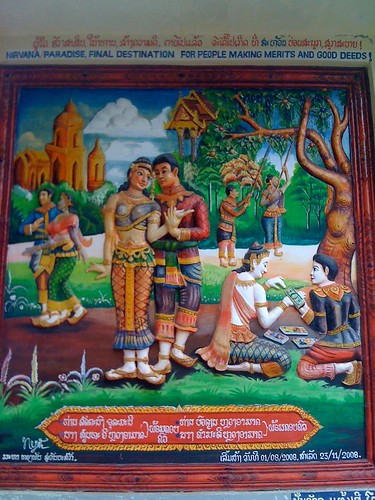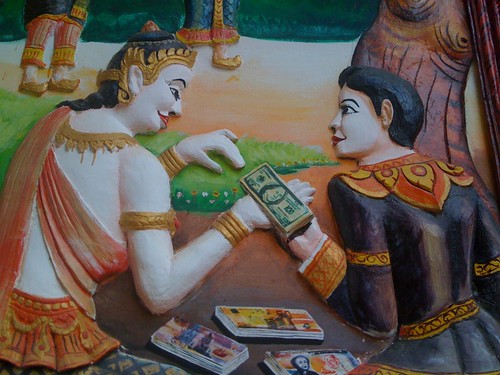During a recent bike ride with some girlfriends along the Mekong River south of Vientiane, I encountered a full-on fire-and-brimstone smackdown about heaven vs. hell, good vs. evil, the chosen ones vs. the infidels. I found the graphic warnings so engrossing that I actually forgot to write down the name of the temple.
Split into two panels, the left side of the wall features brightly dressed, cheerful (perhaps a bit bored?) people paired off in satisfying monogamous couplehood. The text – in Lao and English – reminds us: “Nirvana/Paradise, final destination for people making merits and good deeds!”

I’m not sure what Lao’s celestial company store offers up, but it looks like you can spend American money there. I’m tempted to postpone all that goody-two-shoes stuff till the economy turns around. A girl’s gotta stretch that heavenly dollar.

The right side of the wall would be deeply disturbing if it weren’t so funny. No need to pontificate with words, the text simply reads: “Avechi/Hell for people committing sins and bad deeds!” The 3-D mural screams out the real message: Scorched wailing people with dangling entrails and sinners getting tossed off a cliff, suffering pokes in the butt with pitchforks, chained together by scary demons. My dad never had anything good to say about people with tattoos, and it looks like he was right. You start with a little tramp stamp, and next thing you know your ink has landed you nekkid on a thorny tree with a spear through your back and a satanic dog chomping on your rump.

After a bit of googling, I was thrilled to find that this temple has actually earned some press. The Vientiane Times ran an article in 2009 about temple art that depicts the fate of sinners. I’m pretty sure the temple in the article – Vat Nakhorpha – is the same one I visited, although their photo of the painting is a bit different. I’m guessing the mural got a face-lift after all the attention. Or I could be way off base, as usual. Here’s an interesting tidbit from the newspaper article:
The paintings show a myriad of torturous agony inflicted on those who don’t abide by the five moral precepts: not to tell lies, commit adultery, kill, drink alcohol or steal.
In the paintings some who have lived sinfully are seen to be punished by being sawn in half, while those who have committed adultery are forced into naked climbing expeditions up a giant kapok tree, covered in thorns.
Halfway up the prickly tree the hapless nudists find themselves stuck between the beak and the blade: if they climb higher a huge bird will descend and peck them into tiny pieces; if they descend it will be onto a sharpened sword.
In the meantime those caught lying or drinking alcohol have their tongues cut out, while anyone who killed animals adopts the head of the slain beast.
Those who fight with or kill their parents are thrown into a large pot to boil for all eternity.
Here’s my favorite part: “When asked if they fear this unending agony, some may say that there are no more thorns left on the kapok tree, as many have climbed before them.”
Can’t you just hear a Lao mom saying, “Just because your friend climbed the kapok tree doesn’t mean YOU have to!”
